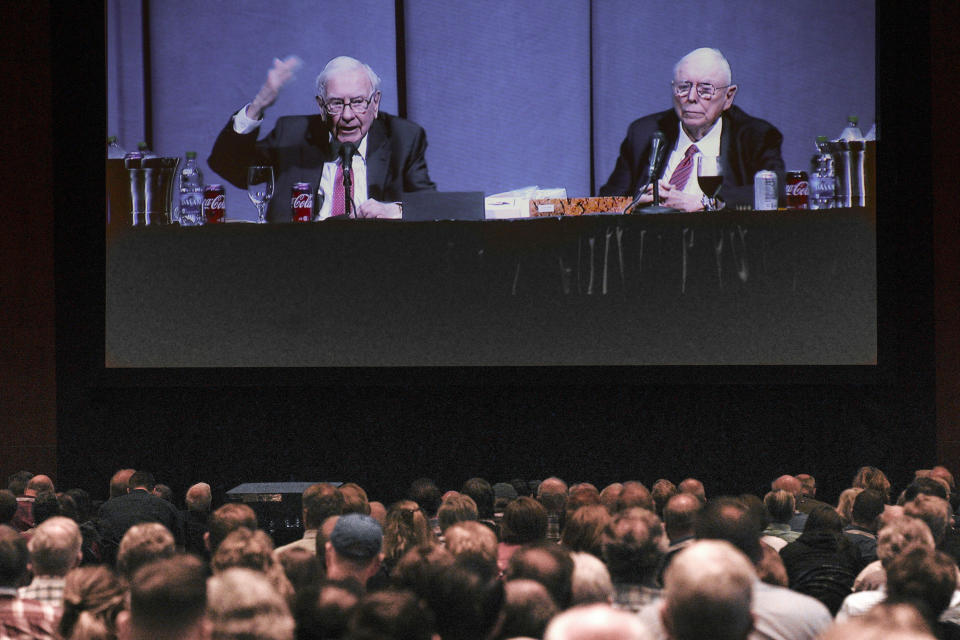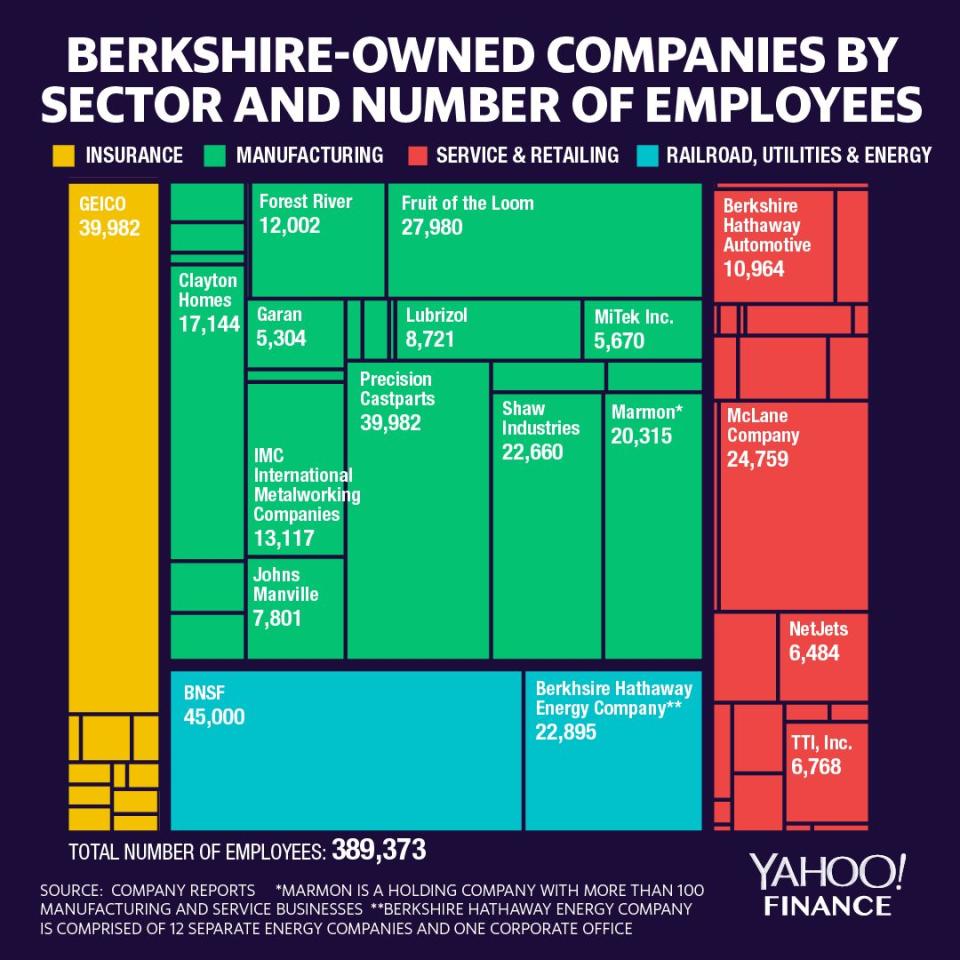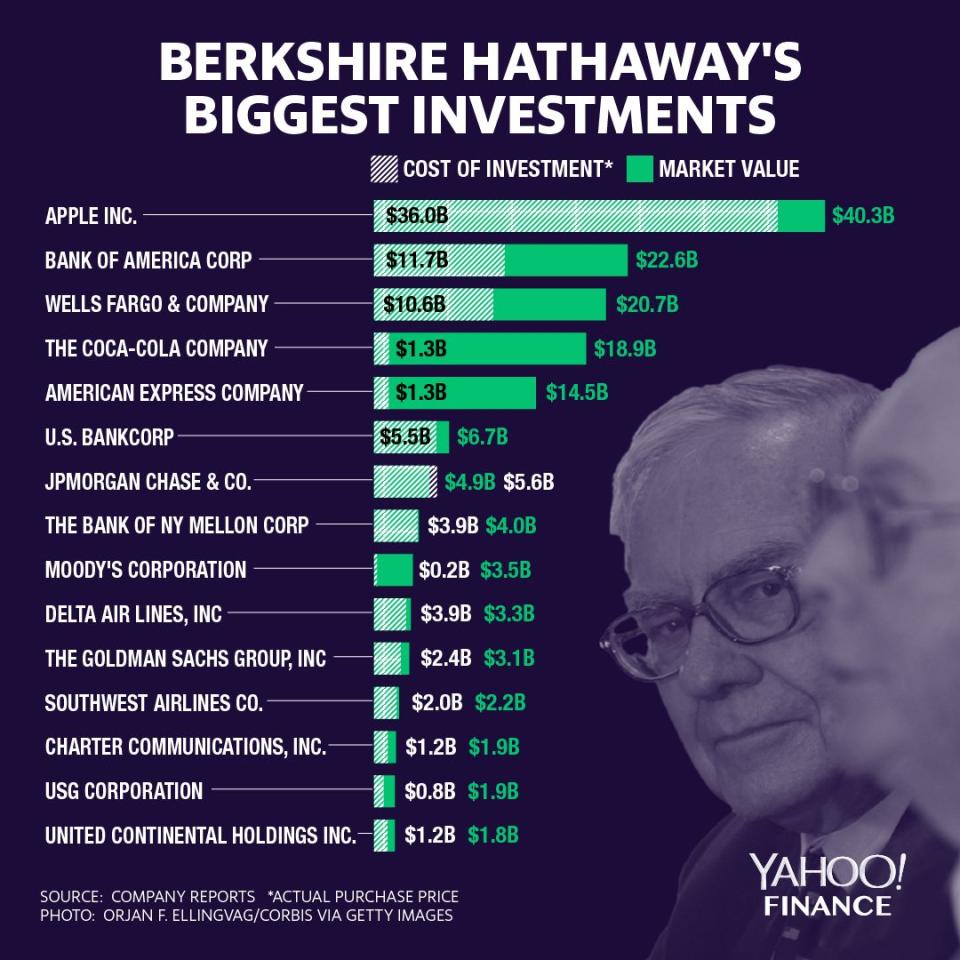Highlights from the 2019 Berkshire Hathaway Shareholders Meeting
Warren Buffett spent Saturday speaking to Berkshire Hathaway (BRK-A, BRK-B) investors as well as the rest of the world at the 2019 Annual Shareholder Meeting in Omaha, Nebraska.
Known as the “Oracle of Omaha” for his track record of picking winning investments, Buffett was joined by his right-hand man Charlie Munger, vice chairman of Berkshire. The duo shared their unscripted views on their company, the financial markets, the economy, politics, corporate governance, and investing.
Their comments on the near-term have been known to move markets. Their insights on the the long-term have earned fortunes for investors.
“I’m a card-carrying capitalist”
Buffett wants to make very clear where he stands regarding economic policy.
"I'm a card-carrying capitalist,” he said. “I believe we wouldn't be sitting here except for the market system and the rule of law on some things that are embodied in this country.”
This comes as socialist policy proposals have gotten increasing amounts of support from the far left.
While Buffett has historically supported Democratic presidential candidates, he does not believe the pendulum will actually swing that far.
"I don't think the country will go into socialism in 2020 or 2040 or 2060,” Buffett said.

“I think we’re all in favor of some kind of government social safety net in a country as prosperous as ours," Munger added. "What a lot of us don't like is the vast stupidity with which parts of that social safety net are managed by the government."
[Read More: Warren Buffett: I'm a 'card-carrying capitalist', rejects US embrace of socialism}
Buying Amazon was a ‘value’ bet
On the Thursday ahead of the meeting, Buffett revealed to CNBC’s Becky Quick that Berkshire had amassed a new position in Amazon (AMZN). He attributed the purchase to “one of the fellows in the office that manage money.” In other words, the decision was made by Todd Combs or Ted Weschler.
This was a troubling development for some Buffett watchers who believe that Amazon stock is closer to its top than its bottom.
During the meeting, an investor asked how “value investors” like Buffett, Combs and Weschler could support such a bet.
"It's interesting that the term value investing came up because I can assure you both managers — and one of them bought some Amazon stock in the last quarter — he is a value investor,” Buffett said.
"The two people that, one of whom made the investment in Amazon, they are looking at hundreds of securities," he added. "Because they are managing less money in their universe, they are looking for things that they feel they understand what will be developed by that business between now and judgment day."
Buffett further argued that all investing “value investing.”
[Read More: Warren Buffett defends Berkshire's Amazon stock purchase as 'value investing']
In defense of Wells Fargo leadership
Wells Fargo continues to recover from its fake account scandal, which the world first learned about in September 2016. The bank admitted that employees had created millions of accounts for clients without their permission.
Wells’ woes led to the departure of CEO John Stumpf in 2016 and more recently Tim Sloan in 2019, who took over for Stumpf.
Some have called for jailing Wells’ top executives including CEOs. Buffett and Munger disagree.
“It looks to me like Wells made some big mistakes in what they incentivized,” Buffett said. “I’ve seen that at a lot of places. That clearly existed at Wells. To the extent that they set up fake accounts, a couple of million of them that had no balance in them, that could not possibly have been profitable to Wells.”
While the top execs were responsible for the incentives, they should not be responsible of the acts those incentives incentivized, Buffett and Munger argue.
“I don’t think people ought to go to jail for honest errors of judgement. It’s bad enough to lose your job,” Munger said. “I wish Tim Sloan was still there.”
[Read More: Warren Buffett and Charlie Munger defend Wells Fargo's disgraced CEOs]
Berkshire’s volatile earnings and growing cash hoard
The meeting kicked off with Buffett delving into the current state of Berkshire and its recent performance.
First and foremost, Buffett decried a new accounting rule that has been making a mess of Berkshire’s net earnings. Specifically, the rule force companies to mark-to-market the value of their stock portfolios. And Berkshire’s portfolio is massive, which has caused wild swings in earnings.
“The bottom line figures are gonna be totally capricious,” he said. “What I worry about is the interpretation...I just hope nobody gets misled.”
That said, Berkshire reported modest growth in its quarterly operating earnings.

Second, Buffett and Munger addressed stock buybacks. During the first quarter, Berkshire repurchased $1.7 billion worth of class A and B shares. This comes as the M&A options remain unattractive.
“We’re going to probably be more liberal when it comes to repurchasing shares,” Munger said.
“In the years ahead, we hope to move much of our excess liquidity into businesses that Berkshire will permanently own,” Buffett said in his 2018 letter to shareholders. “The immediate prospects for that, however, are not good: Prices are sky-high for businesses possessing decent long-term prospects.”
For now, Berkshire’s cash hoard continues to grow. As of the end of Q1, the company was sitting on $114.2 billion, up from $111.9 billion at the end of Q4.
“We are certainly willing to spend $100 billion [on buybacks],” Buffett said should Berkshire’s market value falls below intrinsic value.

Coca-Cola and cannabis
On Friday, Buffett and Munger shared some thoughts on marijuana in response to a question from Fox Business Network’s Liz Claman.
“It would be a mistake for Coca-Cola (KO) to get into the marijuana — cannabis business,” they reportedly said to Claman. “They have a wholesome image and that would be detrimental to it.”
"Our chairman and CEO, James Quincey, has repeatedly stated we don’t have plans to get into this space," a Coca-Cola spokesperson said to Yahoo Finance.
Coca-Cola is arguably the most successful investment Berkshire ever made.
It all began with a ‘monumentally stupid decision’
Buffett, 88, first invested in a Berkshire Hathaway, a failing textile company, back in December 1962, accumulating 7% of the company at $7.50 per share. The company was owned by a man named Seabury Stanton, who in 1964 asked Buffett for the price he’d be willing to sell his stake. Buffett said $11.50, and they had a deal.
However, Stanton later turned around and made a tender offer to shareholders for $11.275 per share. Buffett didn’t care for that behavior, so he ended up hanging on.
“That was a monumentally stupid decision,” Buffett said in his 2014 letter to shareholders. “Irritated by Stanton’s chiseling, I ignored his offer and began to aggressively buy more Berkshire shares.”
Buffett took control of the company in May of 1965. And that was followed by another two decades of tough lessons.
“During the 18 years following 1966, we struggled unremittingly with the textile business, all to no avail,” he said. “But stubbornness — stupidity? — has its limits. In 1985, I finally threw in the towel and closed the operation.”
Despite his great success and status, Buffett’s career is riddled with failures. Ultimately, his real triumph is learning from his mistakes to eventually seal his legacy as the world’s greatest investor.
Furthermore, through letters, interviews, meetings and TV appearances, Buffett has shared his lessons with the public so that they can be better investors themselves. So while many know him as a great investor, there are plenty who will also remember him as a great teacher.

—
Sam Ro is managing editor at Yahoo Finance. Follow him on Twitter: @SamRo
Read more:
Warren Buffett explains why he thinks going to college isn't for everybody
Warren Buffett's definition of 'true success' has nothing to do with money
Warren Buffett identifies the 'best way' to address income inequality
Follow Yahoo Finance on Twitter, Facebook, Instagram, Flipboard, SmartNews, LinkedIn, YouTube, and reddit.